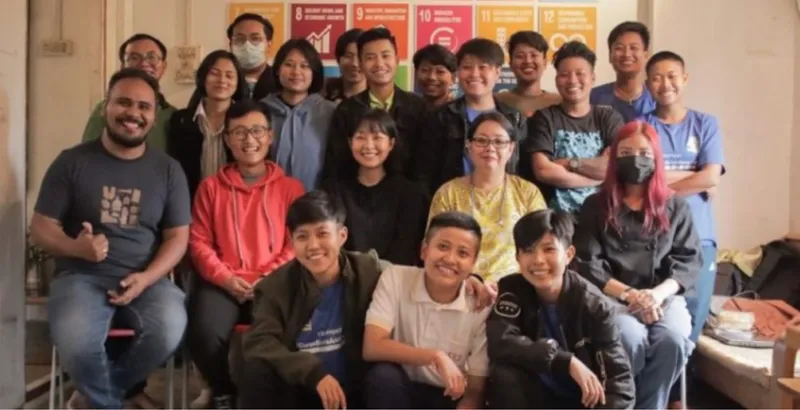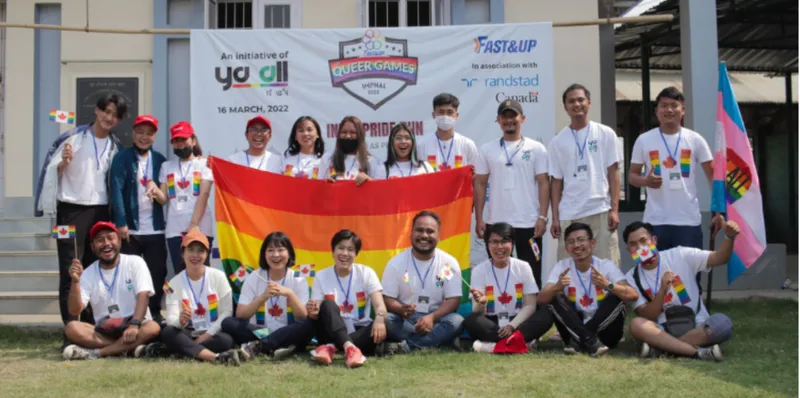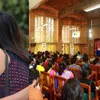[Queer Changemakers] Ya_All is on a mission to Educate, Equip, Empower
From training 30,000 people on mental health, sexual and reproductive health to impacting 1.5 million people through its media platform Scripter, Ya_All is helping LGBTQIA+ youth achieve their dreams.
is an Imphal-based organisation created by young people (queer and allies) for inclusion, wellbeing, and development. A Tata Institute of Social Sciences (TISS) Mumbai-trained development professional, Sadam Hanjabam, Founder, Ya_All is innovating with sports and mental health to open conversations on the inclusion of LGBTQIA+ people in India. You can also read the MannMela illustrated story a detailed account of Sadam’s gripping personal story of growing up in a conflict-ridden region, his struggles with mental health and drug abuse, and the motivation behind starting Ya_All.
How has Manipur changed in your lifetime and where do you see the opportunities for development?
Nowadays, in certain city areas, people are starting to hang out at night because people are getting to feel safe. The generations are changing. For most of us, and for our elders, we have gone through a lot of conflict and intergenerational trauma. They still don’t go out at night. People in their 20s have not seen the fights and encounters.
My generation is in the middle, and we have a critical role in passing on the history, without passing on the trauma. In other areas, the situation is still horrible. We were in another district recently to distribute books, notebooks, and supplies at a government school. There were no teachers, no principal, only a few students, and the parents were trying to run it. Road transportation and connectivity has improved, but the health system, education, and other aspects are still bad.

The Ya_All team with Sadam (second row, seated far left)
How did you get started with Ya_ALL and build this phenomenal team of young people?
It was difficult. We started out as an LGBTQIA+ group in Manipur. Not many people knew about it and the few who di refused to be associated with it. I was privileged in that I had a supportive family and a set of friends who understood me. Studying at an institute like TISS really helped in understanding what was happening around us. After overcoming depression and dependency on drugs, I moved back to Manipur. I wanted to make a difference.
My story was already out there and young people started reaching out to me because I was a local person, and they could relate to the conflict, the language, the migration, and the society we live in.
Social media really helped. We started a WhatsApp group in 2017 and slowly grew from there. We worked as a collective for two years and registered as an organisation in 2019. A few friends who knew me were also willing to help in the initial days as the core team. Over time, many have transitioned out to pursue government jobs among other things, and fortunately, many more younger people have joined the team.
It has now become a larger movement with many intersectional issues and innovative interventions like the Queer Games, mental health, livelihoods, and media and storytelling. We now have 15 staff members and each one comes with their own perspective on what they want to change in society. I am just a catalyst guiding them on how to do things.
Can you give us a bird’s-eye-view of the impact achieved by the team?
We have trained more than 30,000 people in the last three years on mental health, sexual and reproductive health, and wellbeing. We have a media initiative called the Scripter, which is a storytelling and fundraising platform. Our reach through that was 1.5 million.
We were shocked! We are not generating any revenue from there, we are just sharing stories. It became an empathy-driven platform where folks came in and told stories of the pandemic and fundraised for various related issues.
The bigger initiative is in sports with the Queer Games, which we’ve done for five years now. It is becoming international. Last year, the US Consulate herself came down herself to Manipur to open and this year the Canada High Commissioner is coming.
Tell us more about Ya_All’s creative strategy behind the Queer Games initiative?
Many cities do Pride events for mainstream visibility, but one question which came to my mind was the safety, given there are so many components of insurgencies and militarisation. We were not sure how people would react. I wanted to find a way that is acceptable and has some connection with this society. That’s when we thought about sports as a medium of promoting queer visibility.
In Manipur, Holi is celebrated as a five-day festival with many sporting events organised during that time. I connected the dots and asked why not use that platform to introduce LGBTQIA+ players and start the conversation on inclusion? It already has a lot of spectators. When people saw it, they had questions about who are these tomboy or transgender-looking players.
But they were cheering for our players because sports is something that everyone connects to and it has an immediate impact. You can see it then and there. Then we would talk to the people and sensitise them there on the ground itself.

The Queer Games became a platform that used sports as a medium of promoting queer visibility.
In 2020, we built up the first all-transgender team of 21 players. Again, many of them have left and new ones have joined. They are all young people, they're still studying, and looking for jobs. This trans team has become a platform where a young queer people can come in, get that safe space and grow, and then move forward in their life.
A major challenge for grassroots organisations is fundraising…
This is still a challenge. I visit Delhi or Mumbai every now and then for a week and try to meet as many potential partners as possible. Based in the North East, it is difficult for us to gain access to these networking spaces, and it can get tiring. The Queer Games, a once-a-year event, gets a lot of coverage but no one is asking how are we supporting this team for the rest of the year.
In terms of funding, we get some support from corporates and other partners for the event, and whatever we can save, we use that for training the team round the year.
Plan International and Durex have sponsored refreshments for the team in the last few months and we are very grateful for that. We have raised some crowdfunding online and from some individuals as well. That keeps us afloat. What happened during COVID-19 affected us. We worked constantly for the community, but we lost our office and are now working from my home. We really need stable funding for three to five years to sustain and think about how to scale up.
Looking at the larger LGBTQ+ movement in India, where do you see progress happening? and where do we need to be paying more attention?
In the last few years, many small LGBTQIA+ collectives have come up in small cities across the country. Younger people are taking the lead now. However, they need support to be more structured and accountable. Also, the conversation on Diversity, Equity and Inclusion as a whole has definitely increased and more companies are paying attention to this; but we still don’t see issues of the North East being represented in these spaces. There is an othering from the mainland that we can see easily. We need an outlook from intersectional angles.
We are doing it here in Manipur, and we have used sports as a channel for that. Why can’t this be done in say, Mumbai? If there are other organisations interested in replicating or adapting these models like the Queer Games and community mental health in their region, we are ready to help them do that.
Edited by Diya Koshy George
(Disclaimer: The views and opinions expressed in this article are those of the author and do not necessarily reflect the views of YourStory.)

![[Queer Changemakers] Ya_All is on a mission to Educate, Equip, Empower](https://images.yourstory.com/cs/5/f5a7f3304b1211e9b6645b8ae897d03e/Screenshot2022-06-22at11-1655880086528.png?mode=crop&crop=faces&ar=16%3A9&format=auto&w=1920&q=75)






